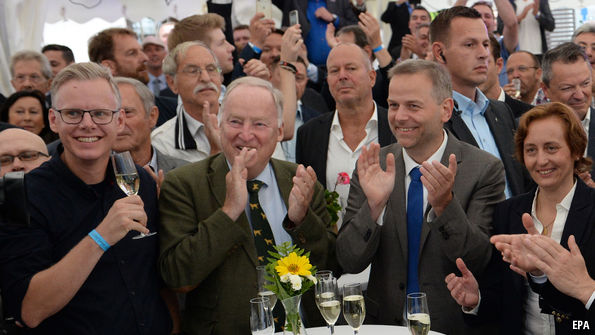After beating Angela Merkel’s party in Mecklenburg-West Pomerania, the populists aim for the Bundestag

CONFIDENT of a strong showing, the Alternative for Germany (AfD), a right-wing populist party, splurged on a visually impressive venue to watch the results of an election in Mecklenburg-West Pomerania on September 4th. Its candidates and supporters gathered in a thatched-roof beach house on a lakeside in Schwerin, overlooking the castle that houses the state assembly. “We tack into the wind,” ran the message on the sail of a boat on the water. And how the cheers went up when the exit polls came in. The party won 21.9% of the vote, putting it second after the Social Democrats (SPD), which got 30.2%—and beating the Christian Democrats (CDU) of Chancellor Angela Merkel, who got just 19%.
This result is the latest in a string of advances for the AfD. It has no hope of entering a governing coalition anywhere in Germany; other parties view it as toxic. Instead, it positions itself as collecting protest votes against a politically correct elite. It will now be represented in nine of Germany’s 16 federal state parliaments. “Finally there is a real opposition again,” bellowed Leif-Erik Holm, the party’s top candidate in Mecklenburg, to his cheering supporters in the beach house. “Maybe today is the beginning of the end of the chancellorship of Angela Merkel.”
As a result of her liberal refugee policy, Mrs Merkel served as the AfD’s bogeyman during this campaign. The chancellor, who grew up in the former East Germany and whose own electoral district is situated in this northeastern state, remains popular with many locals. But when, one year to the day before the election, she opened Germany’s borders to masses of refugees seeking to enter Europe via the Balkans, she lost the backing of much of Germany, especially in the eastern parts where foreigners are relatively rare. Having felt like second-class citizens in a reunified Germany since 1990, many Mecklenburgers, rationally or not, feared they would become aliens in their own country.
The results will have little effect on the government of Mecklenburg, where the mainstream parties are famous for their pragmatic willingness to co-operate. Social Democrats and Christian Democrats could continue to govern together, with a solid majority of the assembly’s 71 seats. Alternatively, the Social Democrats could invite a new coalition partner, The Left (a far-left party descended from the former East German Communists), for a much narrower majority.
But Mecklenburg’s election increases the temperature of federal politics as Germany prepares to choose the next Bundestag in the autumn of 2017. There is no longer any question that the AfD, only four years after its founding, will enter the federal parliament. What is currently a four-party system nationally will probably become a six-party chamber if the liberal Free Democrats also manage to enter, as polls suggest they will.
That fragmentation complicates the coalition mathematics for the centrist parties. Mrs Merkel’s Christian Democrats in particular will be under constant pressure from the AfD, one reason why Mrs Merkel continues to hedge on whether she will stand for another term. But all mainstream parties have reason to worry about the AfD’s rise. The results from Mecklenburg suggest that the AfD made its biggest gains among blue-collar workers, who defected from the Social Democrats by 11 percentage points and from The Left by 8 points. Indeed, The Left has largely been replaced as the preferred home for frustrated easterners by its new rivals on the opposite end of the political spectrum. Perhaps the only good news for mainstream parties, and for all moderate voters, was that the NPD, a neo-Nazi party that had been represented in Mecklenburg’s assembly, was voted out. It will cease to play a major role in German politics. But many of its supporters have simply switched their allegiance to the AfD instead.
No hay comentarios.:
Publicar un comentario